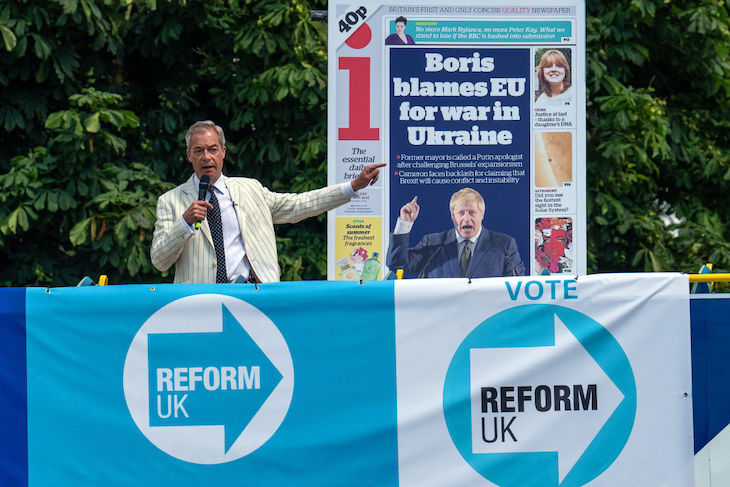So far in this election campaign the consistent theme has been Tory turmoil. A large part of this has been caused by Nigel Farage and his decision to return to frontline politics and lead Reform. Depending on which pollster you pick, Farage’s party is either narrowly behind the Tories on voting intention or ahead of them. The impact of this is that many Tory candidates in once safe seats of majorities of 20,000 plus now fear they could narrowly lose next week when voters go to the polls.
But is Farage finally feeling some pressure himself? On Friday, Farage sat down with Nick Robinson as part of the BBC presenter's series of election interviews where he was asked about Putin. He told Robinson: 'I said I disliked him as a person, but I admired him as a political operator because he’s managed to take control of running Russia.' On the war in Ukraine, he suggested the war was Putin's fault but the West had provoked it by giving the Russian leader an excuse:
'Right, I’ll tell you what you don’t know, I stood up in the European parliament in 2014 and I said, and I quote: ‘There will be a war in Ukraine.' Why did I say that? It was obvious to me that the ever-eastward expansion of Nato and the European Union was giving this man a reason to his Russian people to say, ‘They’re coming for us again’ and to go to war.”
Since that interview, the row has dragged on and dominated the news. Boris Johnson has attacked Farage over the comments – as has Keir Starmer and Rishi Sunak. On Monday, Farage attempted to get out on the front foot with a special press conference billed as his most important speech to date. It was largely a rebuttal to what Farage described as smears against him. He pointed out Johnson had once made similar comments with regards to the EU – and attacked both Labour and the Tories on foreign policy failures.
Ultimately the line from Farage is that he is doubling down on his comments, while trying to fob off accusations that he is a Putin ally. Will it matter in the election? On the latest Coffee House Shots podcast, Fraser Nelson argues that Farage is learning from the Donald Trump playbook. He is leaning into a row on a divisive topic as a way of getting more exposure. However, the Tories believe it is the best attack line to date that they have on their nemesis. So far, the campaign team is finding it difficult to persuade angry disillusioned former Tory voters to back them one more time.
As one campaign aide puts it: 'There will be a group that this speaks to and some voters who will back Reform whatever. But for lots of our base considering voting for Reform, it is unpatriotic and a turn off.' In the UK – unlike with some countries on the continent – support for Ukraine remains high. Anecdotally, Tory candidates say they are finding the comments useful on the doorstep as a way to deter some voters from switching to Reform. Though one says there is a ceiling on the attack as a lot of the potential voters don't have strong views on foreign policy generally. It's just over a week until we find out who is right.







Comments